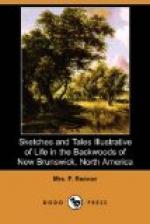with the flames of some far off dwelling, whose inmates
thus called for assistance; but long ere that assistance
could be given, the fire would have done its worst
of destruction, perhaps of death. I have also
heard it, when twilight gathered darkly o’er
the earth, floating sad and mournfully since sun-set,
from some dwelling in the forest’s depths, whose
locality, but for the sounds, would not be known.
Some member of the family has been lost in the woods,
and the horn is blown to guide him homewards through
the trackless wilderness. How sweet must those
sounds be to the benighted wanderer, bearing, as they
do, the voice of the heart, and telling of love and
affectionate solicitude! But Melancthon has driven
his ox-team to the barn, and now, with the baby on
his lap, which, like all the blue-noses, he loves to
nurse, sits down to table, where we join him.
The dinner, as is often the case in the backwoods
in summer, is “a regular pick-up one,”
that is, composed of any thing and every thing.
People care little for meat in the hot weather; and,
in fact, a new settler generally uses his allowance
of beef and pork during the long winter, so that the
provision for summer depends principally on fish,
with which the country is amply supplied, and the
produce of the dairy. The present meal consists
of fine trout from the adjoining stream, potatoes
white as snow-balls, and, pulverising on the dish,
some fried ham, and young French beans, which grow
there in the greatest luxuriance, climbing to the top
of their lofty poles till they can grow no higher.
I have often thought them scions of that illustrious
bean-stalk owned by Jack in the fairy tale. We
have also a bowl of salad, and home-made vinegar prepared
from maple sap, a large hot cake, made with Indian
meal, and milk and dried blue-berries, an excellent
substitute for currants. Buscuits, of snow white
Tenessee flour, raised with cream and sal-a-ratus.
This last article, which is used in place of yeast,
or eggs, in compounding light cakes, can also be made
at home from ley of the wood ashes, but it is mostly
bought in town. The quantity of this used is surprising,
country “store-keepers” purchasing barrels
to supply their customers. A raspberry pie, and
a splendid dish of strawberries and cream, with tea
(the inseparable beverage of every meal in New Brunswick),
forms our repast; and such would it be in ninety-nine
houses out of a hundred of the class I am describing.
Many of the luxuries, and all the necessaries of life,
can be raised at home, by those who are industrious
and spirited enough to take advantage of their resources.
Melancthon this year expects to bread himself,
as well as grow enough of hay to winter his stock.
Since he commenced farming he purchased what was not
raised on the land by the sale of what was cut off
it—that is, by selling ash timber and cord-wood
he procured what he required. This, however, can
only be done where there is water conveyance to market.




